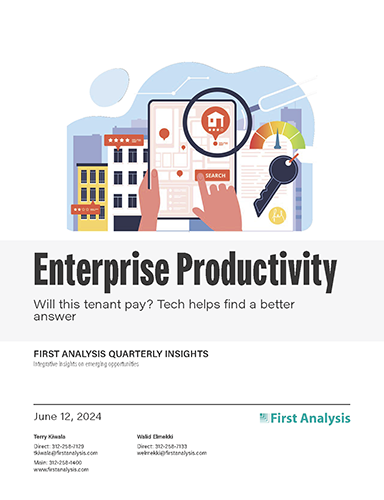Quarterly insights: Enterprise productivity
Will this tenant pay? Tech helps find a better answer

Consumer financial stress resulting from the long-term shortage of housing in the United States and consequent housing inflation appears to be driving an increase in multifamily housing tenant fraud, which was already widespread.
Traditionally, many property managers have used credit scores to evaluate prospective tenants, but credit scores’ backward-looking nature means they don’t capture current financial stress, and credit scores don’t verify income.
These challenges have accelerated the growth of an industry of alternative credit qualification platforms. These platforms leverage the internet’s ubiquitous connectivity with software that taps consumer data sources that previously were impossible to access inexpensively and at scale, such as employment income, rent payment history, and personal expenditures.
We profile 12 companies using alternative data to help landlords and property managers get a better answer to the critical question: Will this tenant pay?
TABLE OF CONTENTS
Includes discussion of six private companies
- Tenant fraud in multifamily is widespread and increasing
- Traditional tenant qualification resources are inadequate
- Alternative credit qualification platforms fill the gap
- Innovators offer a diverse range of alternatives to traditional credit-score-based evaluation
- Tech-enabled alternative metrics: This tenant will pay
- A lost year for the First Analysis Enterprise Productivity Index
- Enterprise productivity M&A: Notable transactions include Crooze and Workzone
- Enterprise productivity private placements: Notable transactions include Ecotrak, FloQast, ParkHub
Tenant fraud in multifamily is widespread and increasing
Recent surveys suggest fraud in apartment leasing is much more widespread than it has been in past years. In a January survey by the National Multifamily Housing Council (NMHC), more than 70% of multifamily property owners and managers indicated they had experienced an increase in fraudulent applications and payments in the prior 12 months, and the average increase in the volume of fraudulent applications was 40.4%. Overall, 93.3% of respondents said they had experienced fraud in the prior 12 months.
Why did this increase occur? A key cause was likely the financial stress resulting from the long-term shortage of housing in the United States. The lack of affordable housing for sale combined with sharply higher interest rates has priced many potential buyers out of the market and kept them in (or pushed them into) the rental market. But the choices in the rental market are not much better as tight supply has pushed rents to high levels and vacancy rates have plummeted to the lowest levels in decades.
Fraudulent activity in apartment leasing occurs in a variety of ways. The first type of fraud is the most blatant: applicants who steal the identity of another person and rent under the false identity with no intention to pay. In this circumstance, landlords must pursue eviction in the courts even though the lease was executed fraudulently. Another type of fraud is more subtle. Applicants execute leases under their own identities but misrepresent their ability to meet lease obligations, usually by falsifying employment or income with altered documents or providing false information on lease applications. These tenants may intend to pay, but their misrepresentations materially understate the risk of their tenancy.

Request full report
To access the full report, please provide your contact information in the form below. Thank you for your interest in First Analysis research.
